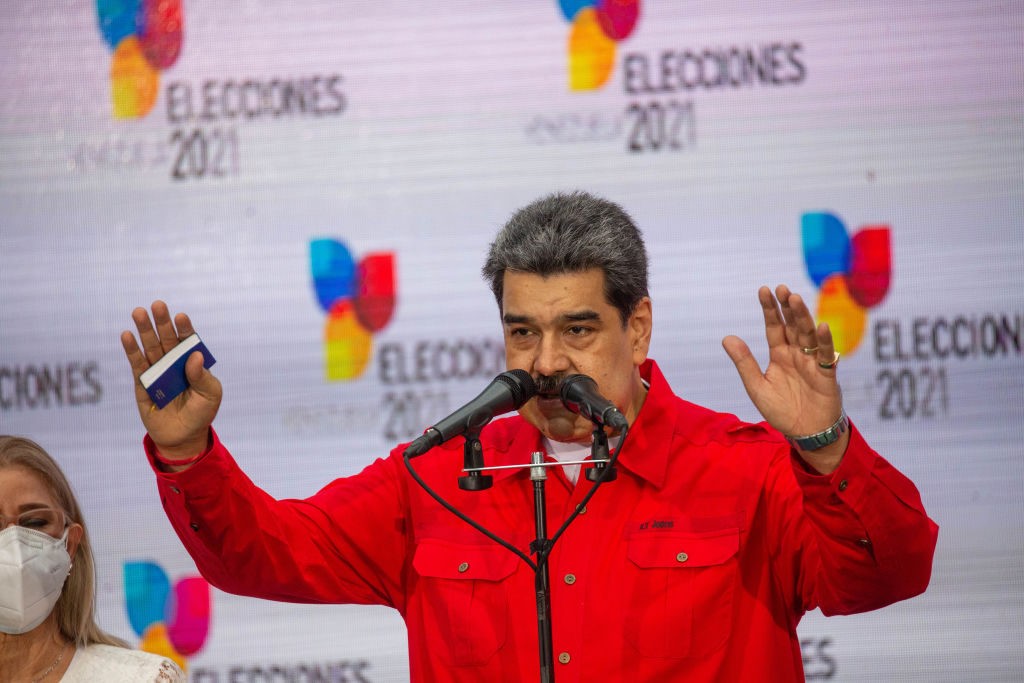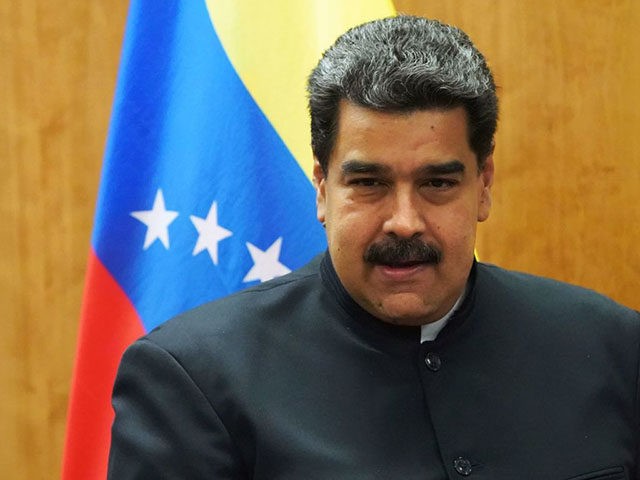Socialist dictator of Venezuela Nicolás Maduro confirmed during a Monday night broadcast that President Joe Biden had sent a delegation to Caracas for a “respectful, cordial, diplomatic” discussion.
Multiple major American media outlets reported that the delegation had traveled to Venezuela on Saturday to discuss potentially buying oil from the repressive Latin American state as a way to offset potential sanctions on oil from Russia. As of Tuesday morning, American media outlets were reporting that Biden had decided to impose a ban on Russian oil later that day.
The ban would be in response to Russia launching a full-scale invasion of Ukraine in late February, allegedly to “de-Nazify” the country by deposing democratically elected President Volodymyr Zelensky. Zelensky has denied ties to Nazism, noting he is Jewish and lost family in the Holocaust.
Maduro is one of Russian leader Vladimir Putin’s top supporters internationally and has enthusiastically promoted Putin’s claims to Ukraine being overrun by Nazis. Maduro’s Venezuela is also heavily indebted to Russia, meaning any profits Maduro makes on selling oil to the United States will likely go to paying Russia, negating the purpose of a Russian oil ban in America.
Maduro reportedly did not mention any potential oil sales to America during his remarks on Monday. Instead, he claimed that Venezuela and the Biden administration had agreed to “an agenda to move forward” on “topics of interest.”
Sen. Marco Rubio (R-FL) on Monday slammed the Biden administration’s secret oil meeting with Venezuelan President Nicolás Maduro as a “huge PR boost” for the socialist regime. https://t.co/SuBvAqGzCH
— Breitbart News (@BreitbartNews) March 7, 2022
“I want to remark that, last Saturday night, a delegation from the government of the United States of America arrived,” Maduro told the Venezuelan public on a national broadcast, according to the Venezuelan news outlet Runrunes. “I received it here in the presidential palace the way I have received on other occasions delegations from other world governments.”
Maduro has been the dictator of Venezuela since predecessor Hugo Chávez died in 2013 but lost his constitutional legitimacy in 2018. The legal president of Venezuela is Juan Guaidó, who was sworn in in 2019 but has failed to exercise any power, as the armed forces still answer to Maduro and Maduro illegally occupies the presidential palace. The United States does not recognize Maduro officially as president of Venezuela.
“We had a respectful, cordial, diplomatic meeting between the United States government delegation and a delegation of the government of Venezuela,” Maduro claimed.
Maduro told the public that he pursued “respect and maximum hope for a better world, to be able to advance an agenda that allows wellbeing and peace among the peoples of our region.” The dictator added that “conversations will continue” with America over “a positive agenda,” but did not mention a single agenda or policy item that Caracas discussed with Washington.
Maduro did mention Venezuela’s languishing oil industry and the war in Ukraine but in separate remarks unrelated to his discussion of the meeting with American representatives.
“We have to say that we are gravely concerned about the possibility of a war in Europe and an extension of this armed confrontation to other regions of the world,” Maduro said of Ukraine. Maduro again repeatedly Putin’s framing of the war as a “de-Nazification and demilitarization of Ukraine.”

President of Venezuela Nicolas Maduro speaks after casting his vote during Venezuela’s regional elections on November 21, 2021 in Caracas, Venezuela. (Manaure Quintero/Getty Images)
Elsewhere, Maduro also claimed that would invest in “advancing the guarantee of internal [supply] of gasoline … petrochemicals, refineries.” The state oil company, Petróleos de Venezuela (PDVSA), has largely collapsed under a socialist regime that has failed to maintain refineries and other core facilities, resulting in Venezuelan oil production dropping to levels unseen since the 1940s. Venezuela’s crude oil is particularly heavy and requires extensive refining.
Multiple major American newspapers and broadcasters reported this weekend, citing anonymous sources, that a Biden administration delegation is seeking a deal to buy oil from Maduro. Maduro’s remarks on Monday are the first confirmation on the record from either head of state that the delegation arrived and met with the socialist leadership.
“A group of senior U.S. officials flew to Venezuela on Saturday for a meeting with President Nicolás Maduro’s government to discuss the possibility of easing sanctions on Venezuelan oil exports,” the Washington Post claimed, “as the Biden administration weighs a ban on imports of Russian oil and gas, according to two people familiar with the situation.”
The United States sanctions Venezuela’s oil industry under the administration of President Donald Trump, a response to a sweeping array of human rights abuses committed by Maduro against pro-democracy protests. The crackdowns on Venezuelan protesters in 2014, 2016, and 2017 were largely possible due to extensive arms deals between the Maduro regime and Russia. Venezuela is billions of dollars in debt to Russia and much of the profits from any potential oil sales to America would likely go back to Moscow.
A deal between the Biden administration and Maduro to buy Venezuelan oil would run into another roadblock: America would necessarily have to negotiate with Minister of Petroleum Tareck El Aissami, one of Immigration and Customs Enforcement’s (ICE) most wanted criminals for his alleged extensive ties to the jihadist organization Hezbollah and involvement in drug trafficking. ICE published a wanted poster for El Aissami in 2019, asking Americans to help find him.
#MostWantedWednesday Have you seen this #mostwanted #fugitive? He's wanted for international narcotics trafficking. https://t.co/mH0f1lVG0Q pic.twitter.com/cHmCEK5Vmt
— ICE (@ICEgov) July 31, 2019
“He facilitated shipments of narcotics from Venezuela, to include control over planes that left from a Venezuelan air base and drug routes through the ports in Venezuela,” ICE stated in its “most wanted” profile of El Aissami.
“In his previous positions, he oversaw or partially owned narcotics shipments of more than 1,000 kilograms from Venezuela on multiple occasions, including those with the final destinations of Mexico and the United States.”
El Aissami was present during Maduro’s remarks on Monday.
#EnVideo📹| Presidente @NicolasMaduro aseveró que si hiciera falta para la estabilidad del mundo, Venezuela podría llegar a producir 3 millones de barriles de petróleo.#SomosTierraDeGracia pic.twitter.com/MrWyF0m5e9
— VTV CANAL 8 (@VTVcanal8) March 8, 2022

COMMENTS
Please let us know if you're having issues with commenting.